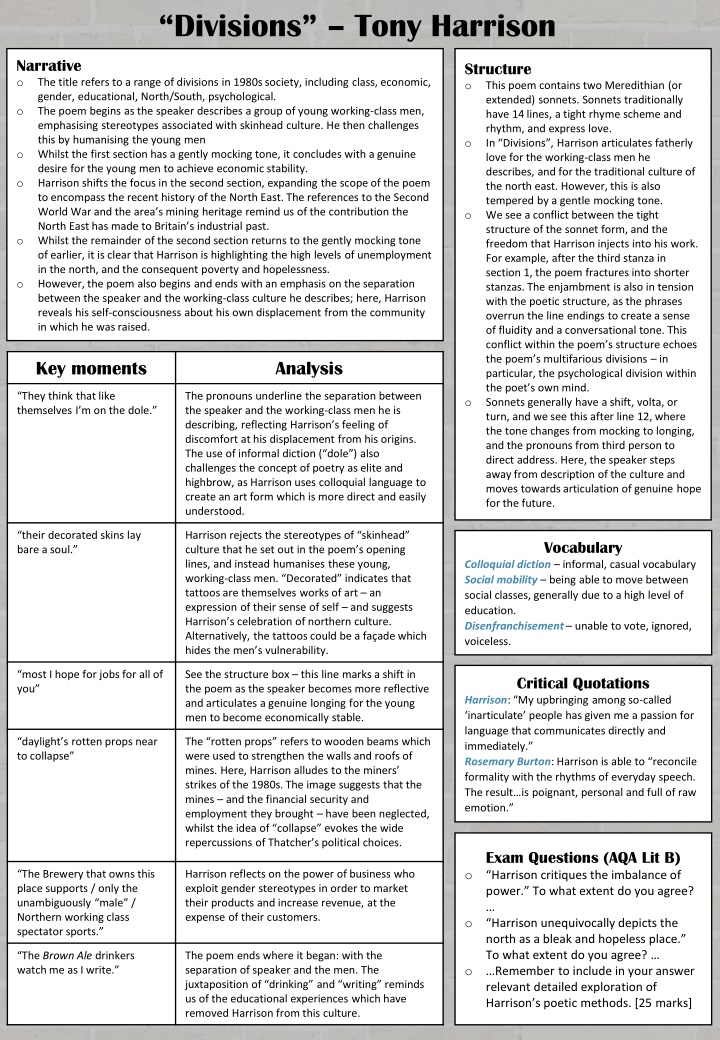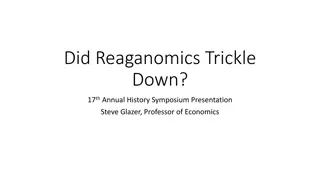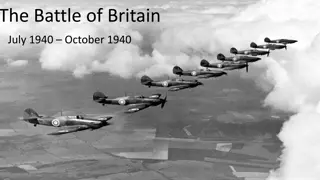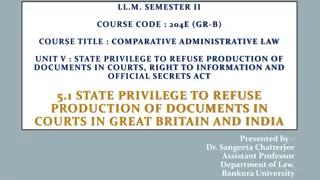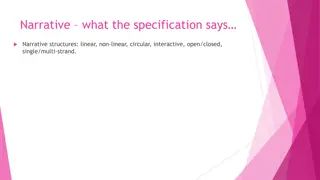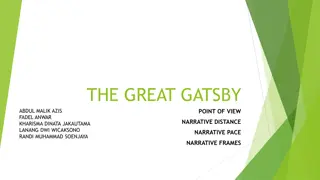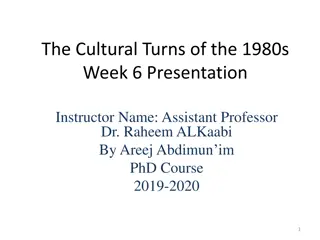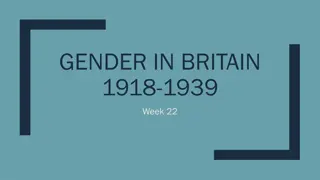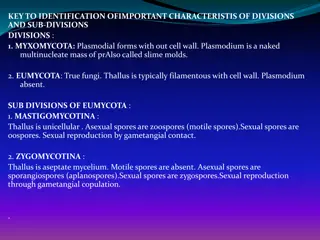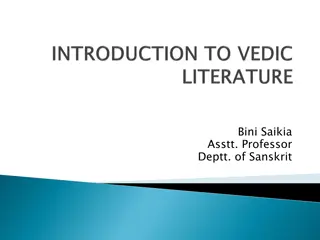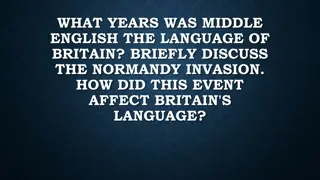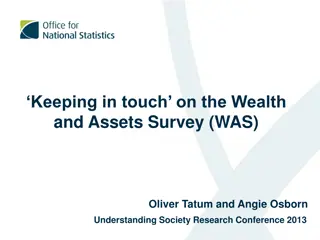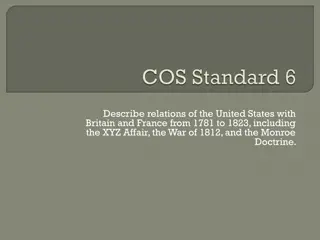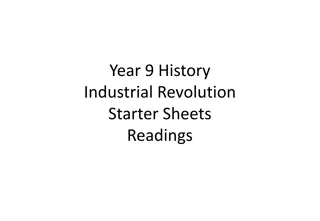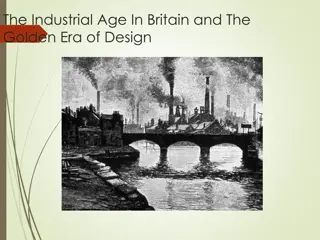Divisions in Society: A Narrative of 1980s Britain
The poem "Divisions" by Tony Harrison explores the societal divisions in 1980s Britain, touching on class, economic disparities, gender roles, educational differences, regional disparities, and psychological divisions. Through its structure, diction, and themes, the poem delves into the complexities of societal stratification, while also reflecting on the poet's own sense of displacement.
Download Presentation

Please find below an Image/Link to download the presentation.
The content on the website is provided AS IS for your information and personal use only. It may not be sold, licensed, or shared on other websites without obtaining consent from the author.If you encounter any issues during the download, it is possible that the publisher has removed the file from their server.
You are allowed to download the files provided on this website for personal or commercial use, subject to the condition that they are used lawfully. All files are the property of their respective owners.
The content on the website is provided AS IS for your information and personal use only. It may not be sold, licensed, or shared on other websites without obtaining consent from the author.
E N D
Presentation Transcript
Divisions Tony Harrison Narrative o The title refers to a range of divisions in 1980s society, including class, economic, gender, educational, North/South, psychological. o The poem begins as the speaker describes a group of young working-class men, emphasising stereotypes associated with skinhead culture. He then challenges this by humanising the young men o Whilst the first section has a gently mocking tone, it concludes with a genuine desire for the young men to achieve economic stability. o Harrison shifts the focus in the second section, expanding the scope of the poem to encompass the recent history of the North East. The references to the Second World War and the area s mining heritage remind us of the contribution the North East has made to Britain s industrial past. o Whilst the remainder of the second section returns to the gently mocking tone of earlier, it is clear that Harrison is highlighting the high levels of unemployment in the north, and the consequent poverty and hopelessness. o However, the poem also begins and ends with an emphasis on the separation between the speaker and the working-class culture he describes; here, Harrison reveals his self-consciousness about his own displacement from the community in which he was raised. Structure o This poem contains two Meredithian (or extended) sonnets. Sonnets traditionally have 14 lines, a tight rhyme scheme and rhythm, and express love. o In Divisions , Harrison articulates fatherly love for the working-class men he describes, and for the traditional culture of the north east. However, this is also tempered by a gentle mocking tone. o We see a conflict between the tight structure of the sonnet form, and the freedom that Harrison injects into his work. For example, after the third stanza in section 1, the poem fractures into shorter stanzas. The enjambment is also in tension with the poetic structure, as the phrases overrun the line endings to create a sense of fluidity and a conversational tone. This conflict within the poem s structure echoes the poem s multifarious divisions in particular, the psychological division within the poet s own mind. o Sonnets generally have a shift, volta, or turn, and we see this after line 12, where the tone changes from mocking to longing, and the pronouns from third person to direct address. Here, the speaker steps away from description of the culture and moves towards articulation of genuine hope for the future. Key moments Analysis They think that like themselves I m on the dole. The pronouns underline the separation between the speaker and the working-class men he is describing, reflecting Harrison s feeling of discomfort at his displacement from his origins. The use of informal diction ( dole ) also challenges the concept of poetry as elite and highbrow, as Harrison uses colloquial language to create an art form which is more direct and easily understood. their decorated skins lay bare a soul. Harrison rejects the stereotypes of skinhead culture that he set out in the poem s opening lines, and instead humanises these young, working-class men. Decorated indicates that tattoos are themselves works of art an expression of their sense of self and suggests Harrison s celebration of northern culture. Alternatively, the tattoos could be a fa ade which hides the men s vulnerability. Vocabulary Colloquial diction informal, casual vocabulary Social mobility being able to move between social classes, generally due to a high level of education. Disenfranchisement unable to vote, ignored, voiceless. most I hope for jobs for all of you See the structure box this line marks a shift in the poem as the speaker becomes more reflective and articulates a genuine longing for the young men to become economically stable. Critical Quotations Harrison: My upbringing among so-called inarticulate people has given me a passion for language that communicates directly and immediately. Rosemary Burton: Harrison is able to reconcile formality with the rhythms of everyday speech. The result is poignant, personal and full of raw emotion. daylight s rotten props near to collapse The rotten props refers to wooden beams which were used to strengthen the walls and roofs of mines. Here, Harrison alludes to the miners strikes of the 1980s. The image suggests that the mines and the financial security and employment they brought have been neglected, whilst the idea of collapse evokes the wide repercussions of Thatcher s political choices. Exam Questions (AQA Lit B) Harrison critiques the imbalance of power. To what extent do you agree? Harrison unequivocally depicts the north as a bleak and hopeless place. To what extent do you agree? Remember to include in your answer relevant detailed exploration of Harrison s poetic methods. [25 marks] o The Brewery that owns this place supports / only the unambiguously male / Northern working class spectator sports. Harrison reflects on the power of business who exploit gender stereotypes in order to market their products and increase revenue, at the expense of their customers. o The Brown Ale drinkers watch me as I write. The poem ends where it began: with the separation of speaker and the men. The juxtaposition of drinking and writing reminds us of the educational experiences which have removed Harrison from this culture. o
Working Tony Harrison Structure o This poem is a Meredithian sonnet see the handout on Divisions for more information. o Unlike Divisions , which shifts from description to direct address, Working is addressed to Patience throughout, demonstrating the pathos the speaker feels for her plight. o Another shift in the poem is from purposefulness (the first section has a clear focus as the speaker protests against mistreatment of workers), to uncertainty (as the speaker questions the authenticity of the poet s role), to certainty (as the poet finds sold ground in his role as providing a voice for the voiceless in society). Narrative o Harrison takes us back to the Industrial Revolution, and recounts the story of Patience Kershaw a young female miner. In 1842. Patience gave her account of the horrendous working conditions to the Children s Employment Commission. o Harrison uses the poem to critique the conditions in which young women and children were forced to work he describes how Patience has become bald due to the friction with the top of the mines. o Harrison then explores his own discomfort with his social position, and the impact his movement from working- to middle-class has on his poetic intentions. He explores the idea that his poetry is a load of crap , written for the bourgeoisie and therefore distanced from the lived experience of the working-classes. However, by the end of the poem, Harrison seems to resolve this internal debate, comparing the writing of poetry to the act of mining as both break the silence of the gob (mouth/mine). The poem therefore concludes with a reminder that the purpose of poetry can be to give a voice to the voiceless and protest against their oppression. Vocabulary Cultural heritage the legacy of cultural resources and works of art which are judged worthy to be passed down the generations. Disenfranchisement unable to vote, ignored, voiceless. Marginalisation being ignored by those who wield power in society. Key Analysis moments turned your crown bald, your golden hair / chafed fluffy first and then scuffed off These lines refer to Patience s baldness, caused by friction (mimicked in the repeated fricatives) with the roof of the mine. Harrison presents us with an image of beauty, identity, humanity and value (the pun on crown , which means top and headdress/the adjective golden golden ) which is gradually destroyed by the working conditions. Critical Quotations Peter Robinson (1998 PhD Thesis, University of Hull): In Working Harrison realises that there is something missing in his verse, that he senses that a writing impelled by a troubled conscience, written to ameliorate the pangs of that conscience, and a footling around with erudite wordplay to achieve this, is not the answer. It is simply not enough. Rather he has to strive for a complete, genuine empathy, he has to strive to achieve an 'unselfish art' that gives others their say. It is Harrison's realisation that this is a strategy that will do justice to those he wants to give a voice to that is described in 'Working'. The point seems to be that he has to avoid the trap of merely exhibiting his 'inwit', his conscience, and allow those he is speaking of to speak for themselves. eggshell Like the adjective fluffy , this word underlines Patience s vulnerability both psychological and physical. The impression given is that she is too fragile for hard labour, and the capitalist machine that exploits children. This image also suggests the impossibility of rebellion. Yet, does this image also suggest a possibility of hope for the future? After all, eggs symbolise birth and new beginnings. You re lost in this sonnet for the bourgeoisie Unlike Divisions which switches from description to direct address in Working the speaker addresses Patience throughout, revealing the pathos Harrison feels for her. However, Harrison self-consciously reflects on the discomfort he feels with using an elite art form to describe a working- class girl. Whilst on the one hand he dignifies Patience and protests against exploitation by placing her within a sonnet to be read by the middle-classes, on the other hand he feels that he is too distanced from her to articulate her experience. Extract from Patience Kershaw s account of her work (1842): I never went to day-school; I go to Sunday-school, but I cannot read or write; I go to pit at five o'clock in the morning and come out at five in the evening; I get my breakfast of porridge and milk first; I take my dinner with me, a cake, and eat it as I go; I do not stop or rest any time for the purpose; I get nothing else until I get home, and then have potatoes and meat, not every day meat. I hurry in the clothes I have now got on, trousers and ragged jacket; the bald place upon my head is made by thrusting the corves. this wordshift inwit s a load of crap Here, Harrison parallels his work as a poet moving words with Patience s employment in moving coal. However, this moment of connection is immediately undermined by the realisation that this idea ( inwit ) is worthless. Throughout Harrison s poetry, the profanities disrupt the idea that poetry is an elite art form, introducing a more rebellious voice and reveal Harrison s frustration at middle-class etiquette. Wherever hardship held its tongue Harrison reflects on how those who are oppressed often do not or cannot speak out. This could be due to disenfranchisement, fear of reprisals, or a belief in the pointlessness of protest. The motif of silenced speech appears throughout Harrison s work and would be a good point of connection between poems. Exam Questions (AQA Lit B) Harrison critiques the imbalance of power. To what extent do you agree? Explore Harrison s beliefs about the role of the poet. Remember to include in your answer relevant detailed exploration of Harrison s poetic methods. [25 marks] o the job / s breaking the silence of the worked-out gob . Just as miners work the gob (the mine), so too do poets break the silence by working their gob[s] (mouths). Again, Harrison parallels the work of the miners with that of the poet, allowing him to see a connection between his own privileged position and that of the workers whose experience he protesting against. o o
National Trust Tony Harrison Narrative o The poem begins with a reference to a bottomless pit in Castleton (a settlement in Derbyshire with 4 caverns). A convict is taken from his warders and abused by those in a position of power (their exact role is ambiguous); they lower him into one of the caverns to test its depth. When the convict is returned to the surface, he is speechless. The abusers beat him, and he still makes no sound. It is possible that the convict has died. o The poem shifts as the speaker addresses gentlemen , suggesting that a better way to find the depth of such caverns is to lower a scholar . o The location shifts to Towanroath, a disused mine shaft in Cornwall preserved by the National Trust. As with much of the country s industrial heritage, this location reminds us of landlords exploitation of workers and the natural landscape. o This final section refers to the gradual death of the Cornish language, a symbol of local culture which was displaced by English in the 19thcentury. The poem s conclusion suggests that those who control language also have the power to write history and to exploit others. Structure o As with the other short poems in this collection, National Trust is a Meredithian sonnet. See notes on Divisions . o The line not even a good flogging is separate to highlight the irony; Harrison seems to adopt the voice of the upholders of our law and order complaining about the convict s lack of reaction to their abuse. However, the counterpoint between the flippant tone and the description of brutality indicates Harrison s condemnation of such corruption. o At the poem s conclusion, Harrison separates the Cornish line and its translation, again drawing our attention to his criticism of the bourgeoisie. Vocabulary Cultural heritage the legacy of cultural resources and works of art which are judged worthy to be passed down the generations. Disenfranchisement unable to vote, ignored, voiceless. Key Analysis moments National Trust The title alludes to a British organisation which preserves and celebrates historical locations (including houses and gardens). Whilst the NT now maintain a diverse range of properties, in the past this organisation was often associated with middle- and upper-class culture. As in Them and [Uz] , Harrison questions the inclusivity of our glorious heritage , which often marginalises working-class and northern voices. The title also prompts the reader to question whether working-class northerners can trust the nation (meaning government and law). stout upholders of our law and order Stout implies greed and also the strength of the upholders , whose exact role in society is unclear however, what is clear is their responsibility for imparting justice and maintaining peace and fairness. The inclusive pronoun our is laced with irony, as the speaker recognises that he is legally part of society, but like many members of the working-class and the disenfranchised feels marginalised and alienated from systems of power. Critical Quotations Harrison wrote that every poem is a momentary defeat of pessimism . This suggests that the criticism and alternative ideologies offered by his poems provide a glimmer of a more progressive world. It could be argued that he sees his poetry as having a political and public function: to challenge hierarchical structures and systemic injustices, and to voice working class experience. flayed, grey, mad, and dumb not even a good flogging made him holler The list of adjectives amplifies the suffering of the convict, who symbolises the brutal exploitation of whose whom society does not value. Dumb and the man s inability to holler conveys his voicelessness and the futility of rebellion against such abuse. Dumb can also mean stupid , and therefore reflects the denial of education to the disenfranchised. Those gentlemen who silenced the men s oath The word gentlemen indicates the power dynamics at play in the poem: we see the bourgeoisie and the upper-classes maintaining ascendency over the proletariat. However, gentlemen also connotes nobility and respectability and thus Harrison uses the word ironically, as the behaviour of the upholders and the landowners in the poem is far from benevolent. As in several of Harrison s poems, silenced recurs as a motif; here it means that the gentlemen were regulating the men s language (as the teacher does in Them & [Uz] ), but also that these men were silenced within the public and political sphere. Harrison refers to his childhood self as a scholar ; is he suggesting that he is the scholar of NT , and that he sees his role as plumbing the depths of British culture and history? And killed the language that they swore it in. The verb killed conveys Harrison s anger at the displacement of Cornish by English the language spoken by upper-class landowners. For Harrison, language symbolises identity, selfhood, and connects the individual to their history and local heritage. The dumb go down in history and disappear. Dumb is repeated here, meaning that those who are silenced will not be able to write or record their own history; as the saying goes, history is written by the victors . Harrison s poetry is an attempt to capture and celebrate that history and culture, and thus to oppose dominant narratives of Englishness/Britishness. Exam Questions (AQA B) In his poetry, Harrison unequivocally condemns those in positions of power. To what extent do you agree? Harrison s poetry provides little hope for the future. To what extent do you agree? Remember to include in your answer relevant detailed exploration of Harrison s poetic methods. [25 marks] o (Cornish-) The speaker feels the need to inform the reader that the poem shifted into Cornish, and then to provide a translation. Whilst the inclusion of a line in Cornish allows Harrison to celebrate and preserve an important aspect of local heritage, it is poignant that he assumes the reader will not understand. o The tongueless man gets his land took Is this an allusion to the myth of Philomela (in the story, she has her tongue cut out so that she cannot speak up after being raped; she is then transformed into a nightingale, whose singing voice is immortalised in Keats s Ode to a Nightingale she becomes a symbol of poetic transcendence)? Harrison concludes his poem with the unequivocal statement that those who are silenced will inevitably be exploited; he provides little hope for a better world. o
Them and [Uz] Tony Harrison Allusions Narrative Section 1 o The poem opens with a sound of lament in ancient Greek and in English. The speaker references Demosthenes, a Greek orator who spoke with a stammer; in the poem he symbolises how an individual with a consummate command of language might struggle to articulate ideas. This is similar to the dilemma Harrison faced, as he sought to give a voice to working-class experience, but questioned the authenticity of this attempt as his education had removed him from his childhood culture. o This initial scene shifts to another example struggling to speak this time, of a scholarship boy in a grammar school, attempting to recite Keats s Ode to a Nightingale . The unnamed teacher stops him, complaining that the schoolboy s pronunciation has mangled the great poet s work. As a result, the child is cast in the role of Shakespeare s drunken porter , the only working-class character in the play. This vignette of the grammar school system highlights how the middle-classes devalued working-class culture and identity, prioritising instead a limited understanding of our glorious heritage . Whilst the scholarship system did provide social mobility, it also perpetuated the silencing of identities and cultures which did not conform to middle-class expectations. o In the next section, we hear the voice of the adult Harrison reflecting on his childhood experience. He comments, in parenthesis, on Keats s cockney accent, undermining the teacher s ideology. o In the final stanza, the teacher s voice returns, shutting the child s trap (mouth/cage), and the child submits ( doffed my flat a s ) to his authority, finding that, as he does so, he stumbles over words just like Demosthenes. Section 2 o Harrison unleashes his frustration and anger in the second section, immediately introducing profane language ( buggers ) and voicing a rebellious desire to occupy your lousy leasehold Poetry . This is a take over, as the northern, working-class poet reclaims his right to an art form that he has been denied access to as a child. Yet Harrison is not going to conform to pre-conceived poetic standards instead, he is going to use a form of art associated with elite, highbrow culture as a vehicle for his own irreverent voice. o Harrison celebrates this in the subsequent stanza, as he uses his own pronunciation ([uz]) and rejects the grammatical rules he learned at school (it is grammatically incorrect to end a sentence with a preposition). He also discards the initials he was reduced to by his teacher, and regains his own name as a symbol of his identity. o The reference to Wordsworth is similar to the earlier allusion to Keats s accent, as Harrison highlights how highbrow culture has transformed these radical Romantic poets into symbols of poetic transcendence. o Despite the poems iconoclastic energy, the poem concludes with little hope for the future, as Harrison s work makes its way into The Times newspaper a bastion of conservative, privileged culture and his selfhood is once again denied through the change of name. Professor Richard Hoggart Born in Leeds in 1918. Grew up in a working class suburb, close to Harrison s suburb of Beeston. Received a grammar school education and a degree from Leeds University. Held professorships in a number of institutes of higher education. Published The Uses of Literacy (1957) this explores the changes wrought upon traditional working class culture by modern media such as mass circulation newspapers, magazines and film. One of the titles of this book is called Them and Us in which Hoggart discusses the defining traits of both upper and working classes. Leon Cortez London born comedian and comic actor who appeared in many radio productions, as well as appearing in film and on television. Famous for his mangling of high culture, especially Shakespeare. The descriptio n of the school The 1944 Education Act created 3 different kinds of schools - grammar schools, secondary technical schools for those with an aptitude for mechanical, scientific and engineering skills, and finally secondary modern schools which would provide education in basic skills and practical subjects. The 11+ examination was a means of finding out which pupils went to grammar schools (about 20-25%) and which to secondary modern. Ideally, grammar schools promoted social mobility as students from working-class backgrounds had the opportunity to gain an excellent education. Many pupils benefitted from the teachers expertise, but for others the transition to the new environment was a lot less comfortable. Middle class pupils were in the majority and working class students found themselves surrounded by children who were more confident, spoke differently, and knew French and Latin. Their insecurity was often heightened by confusions over getting the right books, sports equipment, uniforms etc. Demosthe nes Greek Orator with a speech impediment. The Drunken Porter in Macbeth The Drunken Porter is a working-class servant in Macbeth s castle whose appearance in the play is for humorous effect. He is rude and crude; however, he does satirize the political situation in England at the time of King James I. RP Received Pronunciation - the standard form of British English pronunciation, based on educated speech in southern England, widely accepted as a standard elsewhere. [ s] not [uz] The first phonetic symbol refers to us in RP, whilst the second refers to pronouncing this word as uz instead. Flat cap Workers are often associated with this item of clothing. Glottals a consonant formed by the audible release of the airstream after complete closure of the glottis. It is widespread in some non-standard English accents and in some other languages e.g. butter bu er Leasehold Many flats and houses are sold as leasehold (rather than freehold). That means that although the home owner has purchased the house itself, they still pay rent on the land. It suggests a lack of true ownership. Daniel Jones Professor of phonetics at UCL. Wordswor th s matter/wa ter Romantic poet, born in the Lake District and believed to have spoken with a northern accent. As the first Romantic poet, Wordsworth challenged the literary and political establishment by crafting a poetry that was defined by the voice of a man speaking to men (i.e. not just to the elite).
Them and [Uz] Tony Harrison Structure o See Divisions for notes on the sonnet form. o As in V , this poem is dramatic in form. In the first section, the teacher s voice competes with that of the schoolboy and the adult poet yet this plurality is extinguished in the second section as the adult voice finds its confidence and purpose. This continues until the renaming in the final lines. Key Analysis moments Them and [Uz] The title reveals the entrenched divisions within British society, as the proletariat feel separated from the bourgeoisie and the upper-classes. There are suggestions of conflict and protest against such inequality. The inclusion of the phonetic symbol signals that the theme of accent and its relation to selfhood will be at the heart of the poem. gob full of pebbles outshouting seas Whilst the poem starts in Greek, we quickly shift to the poet s northern dialect in the word gob which echoes the gob of the mine, referred to at the conclusion of Working . The image of the Greek orator outshouting seas conveys the individual s need to be heard, and not to succumb to the chaos and flux of the world around us. mi art aches The schoolboy recites the opening line of Ode to a Nightingale , a poem in which Keats articulates his despair at earthly sufferings, and poetry s transcendental power. Underpinning the irreverent and satirical tone of Them & [Uz] is a feeling of existential angst as the child struggles to find his place in the world. Later in the poem, we learn that Keats actually spoke with a cockney accent a fact which undermines the teacher s views of art. Vocabulary Iconoclastic: attacking cherished beliefs or institutions Irreverent showing a lack of respect for people or ideas who are used to be taken seriously Social mobility the movement of individuals between social strata. Orator an eloquent public speaker barbarian The teacher calls the schoolboy a barbarian due to his accent, thus revealing prejudices against the working-classes and labelling them as uncivilised and lacking in culture. T.W The teacher reduces the schoolboy s identity to a set of initials. Can t have our glorious heritage done to death. The teacher s use of the pronoun our signifies a group who are permitted access to culture and art yet the child feels excluded from this. The phrase glorious heritage alludes to the literary canon, a selected of texts often written by dead white men, and prized for their enduring literary value. However, many critics question the ideologies which have led to the creation of the canon, arguing that it does not reflect a diverse range of cultures. Critical Quotations Rosemary Burton, Introduction to the Bloodaxe Critical Anthology: Education, poetry, articulacy these were powerful weapons which for too long had been in the hands of others. I played the drunken porter in Macbeth. Separating this line emphasises its importance as another example of the child s marginalisation by the grammar school system. However, it could also be argued that Harrison reclaims the role of the drunken porter , celebrating its anarchical and satirical potential. Ken Worpole, Scholarship Boy , in Bloodaxe: Behind what seemed to be a simple issue of correct speech there were complicated political and cultural histories . That shut my trap. Literally, the teacher s words silence the schoolboy. Metaphorically, the education system is confining the child within a social cage. Yet, in the word trap , Harrison is introducing his own accent and dialect into the poem, disrupting the cultural assumptions of his grammar school education. Damian Grant, Poetry Versus History , in Bloodaxe: If Harrison is a political poet then it is in the finding and claiming of a voice that his political activity manifests itself. The right to expression, and the means of expression, are being reclaimed on behalf of a whole community. my mouth all stuffed with glottals Like Demosthenes, the schoolboy finds it challenging to articulate himself as he becomes increasingly self-conscious about his accent a marker of his identity and working-class origins. We ll occupy / Your lousy leasehold Poetry. In direct opposition to the teacher s our , Harrison s we suggests the power of the group as it attempts to disrupt middle-class culture. The adjective leasehold suggests that Poetry is up for rent, and is being transferred from the elite to the democratic. I chewed up Littererchewer and spat the bones The mangling of the word literature indicates a sense of disdain towards the literary canon, as it is elevated and given elite status. Exam Questions (AQAB) Harrison s poetry provides a clear critique of the establishment. To what extent do you agree? Explore the significance of conflict in Harrison s poems. Remember to include in your answer relevant detailed exploration of Harrison s poetic methods. [25 marks] o used my name and my own voice This is an extremely powerful statement of intent, as the speaker claims his own identity and expresses confidence in the power of his poetry. The simplicity of this monosyllabic line is reminiscent of Harrison s determination to write poetry which communicates directly and immediately . o o automatically made Tony Anthony! The poem concludes with an ironic moment, as the speaker s identity is taken from him once more by a bastion of conservative, middle-class culture. He finally has a voice that is valued and heard by others but has to sacrifice his identity to be published.
Marked with D Tony Harrison Narrative o The poem is a lament for Harrison s father, although it is unusual in tone as Harrison reflects on the disconnection between his father s Christian faith, and his own inability to believe. o The poem begins with the father s cremation; the extended metaphor comparing the burning of the body to the baking of bread is surprisingly unsentimental and potentially appears to be callous. o However, in the following lines the speaker seeks reassurance as his father s sight becomes ablaze and he is reunited with his wife. o At the same time, the father s tongue burst[s] into flame yet Harrison immediately undercuts any metaphorical interpretation by insisting that this is a literal event. o The speaker then reflects on his own lack of faith, his father s marginalisation from society, and his desire to be liberated from suffering. o The poem s conclusion is extremely poignant, as it ends with a sense of failure as life is reduced to ash. Overall, Harrison creates the sense that a worker is a cog in a capitalist machine, whose belief in God is in reality the opium of the masses that anaesthetises the pain. Key moments Analysis Marked with D The most obvious reference is to the nursery rhyme Pat-a-Cake , in which the loaf is marked with a B for Baby . However, whilst Harrison is clearly celebrating his father s role as a baker, his poem is about death rather than birth. Marked could also suggest being scarred by experience, or may refer to the written page, whilst D could also signify divisions. I thought of his cataracts ablaze with heaven light streaming from his mouth Whilst the tone of this elegy is at times irreverent and critical, here Harrison reimagines the fires of cremation, describing them using heavenly imagery. The verbs ablaze and streaming suggests inspiration, transcendence, and power, whilst the light signifies hope and redemption. It seems as if his father has found his voice. his cold tongue burst into flame, / but only literally, which makes me sorry This line continues the imagery from the opening of the sonnet however, Harrison quickly undercuts any metaphorical interpretation and, in doing so, undermines the sense of hope. I get it all from earth my daily bread Harrison alludes to the Lord s Prayer, in which daily bread provided by God also represents his spiritual support. Harrison insists that he finds his physical, intellectual, and spiritual sustenance on earth, thus denying his father s religious beliefs. the tongue that weighed like lead The motif of mouths and speech is found throughout this poem as well as many other Harrison texts. Ostensibly, the line suggests that Harrison s father is unable to speak due to his marginalisation. On closer inspection, the reference to lead is not simply colloquial, but is appropriate as it reminds us of the north s industrial heritage. England made to feel like some dull oaf Despite the ideological differences between father and son, Harrison does not openly criticise his relative instead, he sees him as a victim of England . The nation (as in National Trust ) has denied the working-class man a fulfilling education, a sense of enfranchisement and selfhood. Vocabulary Elegy a lament for the dead Poignant evoking a keen sense of loss Ironic happening in a way contrary to what is expected Structure o See Divisions for notes on the sonnet form.
V Tony Harrison Narrative Structure Vocabulary Key Analysis moments Critical Quotations Exam Questions (AQA Lit B)
